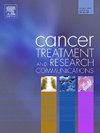PD-1/PD-L1抑制剂下免疫相关不良事件的管理:来自摩洛哥现实世界经验的见解
IF 2.4
Q3 Medicine
引用次数: 0
摘要
pd -1和PD-L1抑制剂,包括派姆单抗和阿特唑单抗,可以改善几种恶性肿瘤的生存结果。然而,它们的使用往往与免疫相关不良事件(irAEs)有关,这可能给管理带来挑战,特别是在摩洛哥等资源有限的环境中,真实数据仍然稀缺。目的分析摩洛哥患者接受派姆单抗或阿特唑单抗治疗时irae的发生率、谱和严重程度,并根据ASCO和ESMO指南评估管理方法。方法对2018年1月至2024年7月31例接受Pembrolizumab或Atezolizumab治疗的患者进行回顾性多中心分析。从患者记录中收集临床数据,并根据不良事件通用术语标准(CTCAE) v5.0进行评估。结果在纳入的31例患者中,13例(41.9%)发生至少一种免疫相关不良事件(irAE),共15例事件。大多数irae发生在内分泌(16.1%)、肺部(12.5%)、皮肤(12.5%)和胃肠道(6.5%)。大多数毒性为1-2级,2例患者发生严重的3级肺炎和结肠炎,需要住院治疗。治疗主要基于皮质类固醇治疗和支持性护理。重要的是,irae导致5例患者(16.1%)暂时中断治疗,2例患者(6.5%)最终停止治疗。大多数患者在适当的irAE管理后获得了良好的临床改善。结论早期识别和处理急性肾损伤是减少并发症和优化预后的关键。这项研究强调了在摩洛哥的情况下需要标准化的协议和加强监测。本文章由计算机程序翻译,如有差异,请以英文原文为准。
Management of immune-related adverse events under PD-1/PD-L1 inhibitors: Insights from a Moroccan real-world experience
Background
PD-1 and PD-L1 inhibitors, including pembrolizumab and atezolizumab, have improved survival outcomes in several malignancies. However, their use is frequently associated with immune-related adverse events (irAEs), which can pose management challenges, particularly in resource-limited settings like Morocco where real-world data remain scarce.
Objective
To characterize the incidence, spectrum, and severity of irAEs among Moroccan patients treated with pembrolizumab or atezolizumab, and to assess management approaches in light of ASCO and ESMO guidelines.
Methods
We conducted a retrospective multicenter analysis between January 2018 and July 2024, involving 31 patients receiving Pembrolizumab or Atezolizumab. Clinical data were collected from patient records and assessed according to the Common Terminology Criteria for Adverse Events (CTCAE) v5.0.
Results
Among the 31 patients included, 13 (41.9%) developed at least one immune-related adverse event (irAE), for a total of 15 events. The majority of irAEs were endocrine (16.1%), pulmonary (12.5%), cutaneous (12.5%), and gastrointestinal (6.5%). Most toxicities were grade 1-2, while 2 patients developed severe grade 3 pneumonitis and colitis, requiring hospitalization. Management was based primarily on corticosteroid therapy and supportive care. Importantly, irAEs led to temporary treatment interruption in 5 patients (16.1%) and definitive discontinuation in 2 patients (6.5%). Most patients achieved favorable clinical improvement following appropriate irAE management.
Conclusion
Early recognition and management of irAEs are essential to minimize complications and optimize outcomes. This study highlights the need for standardized protocols and enhanced monitoring in the Moroccan context.
求助全文
通过发布文献求助,成功后即可免费获取论文全文。
去求助
来源期刊

Cancer treatment and research communications
Medicine-Oncology
CiteScore
4.30
自引率
0.00%
发文量
148
审稿时长
56 days
期刊介绍:
Cancer Treatment and Research Communications is an international peer-reviewed publication dedicated to providing comprehensive basic, translational, and clinical oncology research. The journal is devoted to articles on detection, diagnosis, prevention, policy, and treatment of cancer and provides a global forum for the nurturing and development of future generations of oncology scientists. Cancer Treatment and Research Communications publishes comprehensive reviews and original studies describing various aspects of basic through clinical research of all tumor types. The journal also accepts clinical studies in oncology, with an emphasis on prospective early phase clinical trials. Specific areas of interest include basic, translational, and clinical research and mechanistic approaches; cancer biology; molecular carcinogenesis; genetics and genomics; stem cell and developmental biology; immunology; molecular and cellular oncology; systems biology; drug sensitivity and resistance; gene and antisense therapy; pathology, markers, and prognostic indicators; chemoprevention strategies; multimodality therapy; cancer policy; and integration of various approaches. Our mission is to be the premier source of relevant information through promoting excellence in research and facilitating the timely translation of that science to health care and clinical practice.
 求助内容:
求助内容: 应助结果提醒方式:
应助结果提醒方式:


